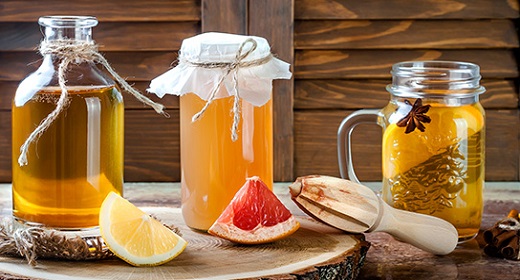by Brittany Wright: Kombucha is a fermented tea that has been popularized by yoga culture and in holistic health circles…

Though these groups have brought kombucha mainstream in North America, its consumption goes back thousands of years. The first documented record of kombucha was in 220 B.C., where it was prized in the Chinese Tsin Dynasty for its energizing and detoxifying properties; it was known as the “tea of immortality.”
Kombucha is made by combining black or green tea with sugar, and then introducing a scoby, a symbiotic culture of acidic acid bacteria and yeasts. The bacteria ferment the sugar in the tea, converting the majority of it into byproducts such as organic acids and a negligible amount of alcohol—typically only around one percent by volume. The end product is an effervescent beverage that is slightly sweet, a touch tangy, and unlike anything else you have probably ever tasted.
Beneficial Components
Kombucha has been touted for several health benefits. Most of these benefits, however, are not well researched. Claims that kombucha is a digestive aid, cures cancer, or eases arthritis come mostly from cultural tradition and anecdotal evidence. From an Ayurvedic perspective, kombucha is similar to vinegar. It is acidic by nature; therefore, it enhances digestion and builds heat.
Through the eyes of Western medicine, kombucha does contain a mix of healthy constituents. Components present in kombucha include B vitamins, several organic acids, and polyphenols (compounds present in plants that have various beneficial effects when ingested by humans). While the effects of the whole kombucha beverage require further study, the functions of these constituents are well known.
B Vitamins
B vitamins fulfill a myriad of roles in your body, including enhancing mood and energy, and promoting wound healing.
Organic Acids
Fermented kombucha contains several organic acids—notably, glucuronic acid. Glucuronic acid helps bind toxins such as drugs, chemicals, and pollutants into a water-soluble form that can be excreted by the kidneys.
Polyphenols
Polyphenols are associated with increased UV light protection, as well as decreased risk of cancer, heart disease, diabetes, osteoporosis, and neurodegenerative disease.
Probiotics
Probiotics, present in home-brewed kombucha, are beneficial for gut health, mood regulation, and the immune system. However, commercial kombucha available in grocery stores has undergone pasteurization as part of the safe-food handling regulations for commercial beverages. This pasteurization renders most probiotics in commercial kombucha inactive.
Risks of Kombucha
Consuming kombucha is generally accepted as a safe and potentially healthful practice. However, there are a few risks of which to be mindful.
- As with any home fermentation, only brew your own kombucha beverage under safe conditions. Consider taking a class from a reputable teacher well-versed in safe and mindful home fermentation.
- Avoid using ceramic fermentation vessels as they can leach lead into your beverage.
- Do not drink kombucha if you are pregnant or have a compromised immune system. Although the risk is small, it—like all fermented products—carries the risk of containing harmful bacteria.
- Pay attention to sugar content. If you are buying store-bought kombucha, check the label to be sure it contains no more than 3 to 4 grams of sugar per serving.
- Due to the acidic nature of the beverage, it is best to limit consumption to 4 oz. daily.
As is the case with all foods and beverages, there is no miracle food. However, kombucha is at least a generally safe beverage, and at best a probably healthy medicinal drink.
Not interested in risking the home fermentation process? You can find pasteurized kombucha at your local grocery store—typically in a refrigerated section near the produce. Open slowly and over a sink, as most store-bought kombucha provides endless bubbles upon opening. Cheers!








































